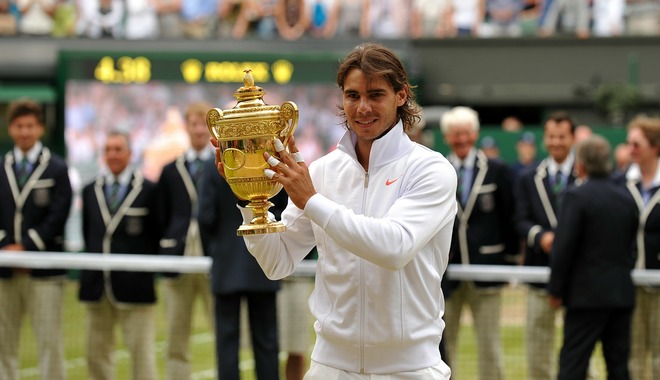By Charles Bricker
And so at the precise age of 24 years, 1 month and 1 day, Rafa Nadal won his eighth Grand Slam title, exactly 10 months younger than when his elite contemporary, Roger Federer, won his eighth major back in 2006.
Although statistically this 6-3, 7-5, 6-4 triumph was close to even, it was decisive enough to leave no doubt about Nadal being, at this moment in tennis history, the best player in the game and, more importantly, this victory and Federer’s dismissal in the quarterfinals must rekindle that very good debate about who is the greatest player ever.
Is it, as many have been claiming for some time, Federer? Or is it Nadal. Or Pete Sampras. Or Rod Laver.
The purists might like Laver and there are significant reasons to grant this unofficial title to Sampras. But because these two men — Nadal and Federer — are at the forefront of the game right now, the probability is that any discussion about the greatest ever is going to center on them.
There are strong arguments for both men, but the more Nadal wins the more he looks to have an edge — if not now, then very soon in the future — in being pronounced greatest ever.

Heavily in Federer’s favor is a record 16 Grand Slam singles titles, double Nadal’s current collection. But Federer will turn 29 years old on Aug. 8. Nadal is only just 24 and has, as noted, won his eighth major at an earlier age than did Federer.
Also heavily in Federer’s portfolio is that record run of semifinal finishes at Grand Slams. It is, without question, a prodigious effort. But, despite all the titles and five straight Wimbledon championships, there is one telling statistic that tarnishes Federer’s claim to greatest ever.
Many will argue than head-to-head competition is not important in this debate because some players simply match up well. There was a period when Wayne Ferreira defeated Sampras four times in a row, but Pete eventually figured it out and retired with a 7-6 edge. No one, however, would argue that Ferreira was a greater player.
The Nadal-Federer matchup is different. We’re not talking about merely just another top-20 player (Ferreira) who never came close to winning a major. We’re talking about the two pre-eminent players of their time.
If you’re going to be considered the greatest player ever, it means, almost by definition, that you’re better than every other player. Nadal has not only won 14 of the 21 times he’s played Federer, but he has beaten Federer six of the last seven matches, including the last three times they’ve met in a Grand Slam final, and each of those three times on a different surface — clay (French Open), grass (Wimbledon) and hardcourt (Australian Open).
When you put these two men on the same court and have them match skills against each, that’s a litmus test.
This head-to-head edge speaks more to Federer NOT being the greatest ever than it does to Nadal BEING the greatest ever. At least not yet. He’s going to have a career as long as Federer’s and come close or exceed Federer’s major titles.
Is that going to happen?
Nadal got through Wimbledon with only a minor flareup of the tendonitis in his knees — the same problem that destroyed his 2009 season and led to his early loss at the French Open and his inability to play Wimbledon. Until he puts together a couple years without any major knee problems, there is going to be a lingering suspicion about his durability and, of course, his ability to stay on court long enough to approach 16 (or more) Slam wins.
Federer won his first Grand Slam title (2003 Wimbledon) at the age of 21 years, 11 months and 6 days. Nadal won his first (2005 French Open) at 19 years, 0 months and 2 days.
Federer won his eighth major at 24 years, 11 months and 1 day — 10 months later than Nadal.
But since that time, Federer has won eight of the 16 Slams he’s played. Can Nadal equal or exceed that?
It will be more difficult for him than it was for Federer, who increased his titles at a time when the best young talent in men’s tennis was still evolving — Novak Djokovic, Andy Murray and, to some extent, Nadal.
All those players, plus now Juan Martin Del Potro and Tomas Berdych, are greatly improved. None has yet reached their peaks, and that’s going to make winning Slams more difficult.
What does it all mean? Who, then, is the greatest? It’s a question that shouldn’t be answered for another couple years. One thing seems certain. Even those who prematurely proclaimed Federer the greatest ever must be reassessing their views after this Wimbledon.
Charles Bricker can be reached at nflwriterr@aol.com
